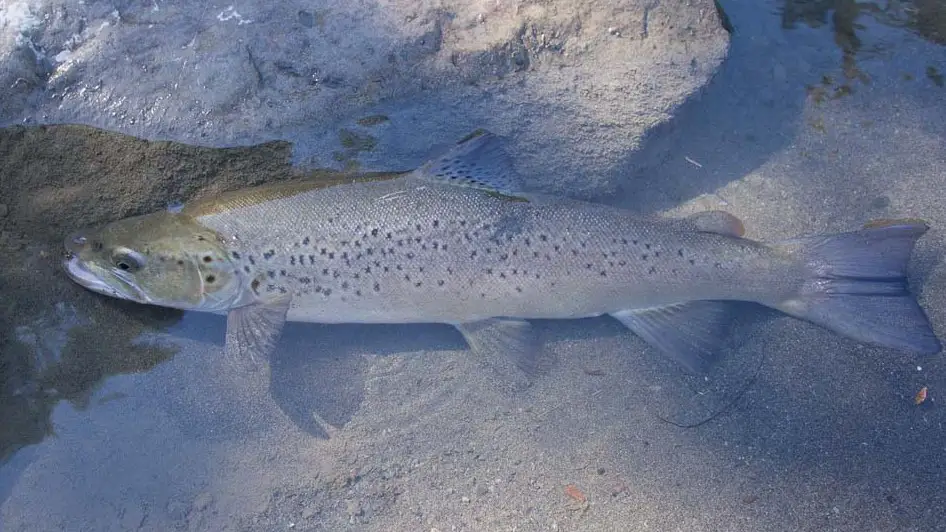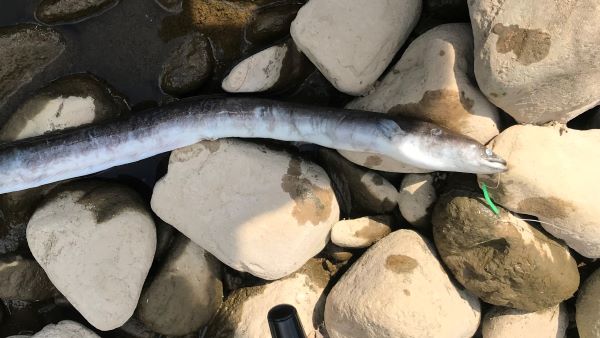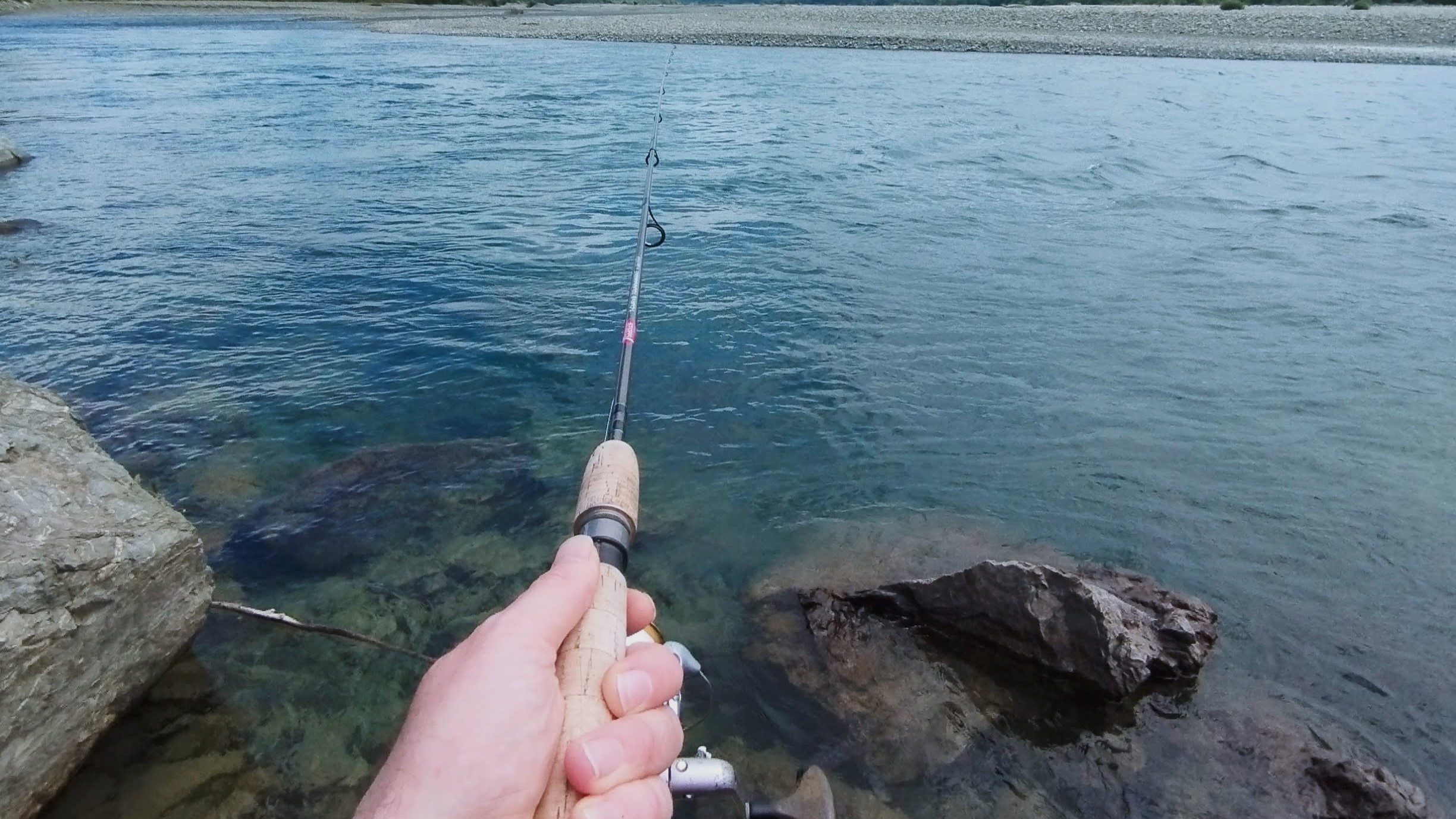I have nothing against bait fishing, I grew up fishing bait and have caught many of my biggest and most memorable fish on it. When saltwater fishing, smelly, fresh bait is usually my first choice. It is also an excellent method for catching trout fresh from the hatchery.
Freshwater fishing for wild trout is different for me. I rarely fish bait when targeting such fish. I really only get it out when researching for an article or fishing for stock trout with my family. The rest of the time I will be reaching for either my fly or spinning rod which I will use to fish flies or hard lures such as inline spinners. My dislike of bait even transfers somewhat towards soft plastic lures.
I first and foremost fish for wild trout for their sporting value.
Before I start discussing my reasons why. I want to make clear that I have nothing against anyone who prefers to bait fish for trout, including wild trout. In many places, it is certainly a valid, legal, and highly effective method to catch trout. At certain times it will certainly outfish any other method, that is something I do not deny.
Fishing live minnows in the early hours of the morning have even resulted in some of my largest trout, large territorial browns that hide beneath overhanging willows during the day and only leave their sanctuary at night to pounce upon unexpected baitfish.
When I am not feeling energetic, there is little that is more relaxing than to cast out a few balls of powerbait and lay back in the shade while waiting for the bobber to disappear beneath the surface.
1) Lures and flies allow me to fish more actively, and more involved.
When I fish for trout in rivers and lakes, it is a lot like hunting. First I have to find the trout, then I have to trick the trout. I simply enjoy the challenge this more active style of fishing offers.
I move around a lot more when lure or fly fishing. I actively stalk the fish while working my way up a river or around a lake. I need to plan ahead and figure out where to land every cast and control the speed of my retrieve to maximize my chance of success.
It is also very exciting watching trout chase after and gulp down a large streamer or Rapala. I love pausing them in the shallows and watching a trout slam into them.
I know in theory it is possible to actively fish bait, for example, cast and drift worms and crickets below bobbers while fishing ripples. But it is very easy to lose bait repeatedly casting them out, I find myself spending more time replacing bait than fishing.
So when fishing with bait, I prefer to fish it passively. I leave the more active styles for my spinning or fly rod.
2) Flies and lures simply do a better job at representing common trout food

This one might sound a bit controversial, how can something artificial flies do a better job at representing a trout’s diet than a natural worm or fish?
While worms, minnows, crickets, and various doughs are all popular trout baits, in the wild these options work only in specific circumstances.
It is important to remember that trout are visual feeders, they look at their meal to determine if they want to eat it. For this reason, in moving water especially, appearance is significantly more important than scent and flies simply do a much better job at representing the most common diet of wild and holdover trout.
If you have ever gutted a wild trout, most of the time their stomachs are filled with small aquatic insects like mayflies, caddis, or stoneflies (or their nymph forms). In lakes and stillwater, it is not uncommon to also find snails, leeches, damsel flies, and water boatmen. With the possible exception of leaches, all are too small to thread onto a hook.
With the exception of worms (trout love them), it is only during very specific circumstances that trout predate on the type of foods we commonly use for bait.
During the heat of the summer terrestrial season crickets will likely slay trout after trout but are more commonly ignored the rest of the year.
Power baits, are certainly effective when trout remember their hatchery diet, but wild trout often outright reject them.
Minnows and other small fish work well the trout are actively hunting small fish, but throwing one out in the middle of a hatch rarely brings positive results.
3) I get more unwanted bycatch when fishing bait
In some of the rivers and streams I fish, the chub seems to outnumber the trout a hundred to one. The moment a worm hits the water, the chubs will be onto it. It is even worse when night fishing, every worm catches a chub. It’s a nightmare. They are simply much more aggressive and numerous than the trout. If I wanted to fish worms, I probably will have to release 50 chub for every trout. This gets tiring fast.
Chub, on the other hand, seems slightly less keen to go after lures and flies. When fishing flies, I might only have to catch a dozen chub before a trout finally gets a chance to strike. Large spinners are better still, I might only catch three or four chubs for every trout. I like chubb, they are pretty fish but I have no desire to spend all day releasing them.
Chubs are not the only problem. Many fish species hunt primarily by smell (trout are visual feeders), the smells from a minnow bait can easily grab the attention of a catfish or be swallowed by an eel. Eels are cool fish, but they twist and turn and cover everything in slime. The last thing I want to do is catch one when after trout.
Although possible, I have never caught either species on fly or spinner, but have caught them numerous times on bait. A mate I was fishing aside once caught a massive long-fin eel while streamer fishing at night in New Zealand, it made an absolute mess of his fly line. Was quite amusing to watch.

4) Trout are more likely to swallow hooks when bait fishing
When I go trout fishing, I fish for the entertainment value and not to put food on the table. For this reason, I hope to release every trout I catch. I want them to swim around strong and healthy, this gives someone else might get the chance to land it another day.
My biggest issue with bait fishing is that trout are simply more likely to swallow the hook, which will then end up catching them in the gut, throat, or gills. This is not speculation based on anecdotal experience, but numerous studies have shown mortality rates approaching 90% for released fish after swallowed hooks have been removed.
As far as I see it, once a trout swallows a hook I only have two options, cut the line, or keep the fish.
I do not like releasing fish trailing line, there is already too much plastic waste in our environment. With that said, trout do have a higher rate of survival if the line is cut, and many are able to pass the hook naturally after a few days or weeks.
This research paper from John W. Mason and Robert L hunt is one such example. They deliberately deep hooked 400 rainbow trout, from half the researchers removed the hooks, using a combination of long nose pliers and fingers. From a further 200 trout, they cut the line leaving the swallowed hook in place. 88% of the trout that had the hooks removed died, all within the first three days of the experiment, compared with only 34% of the group where the hook was left in place. The experiment lasted for three months. None of the trout in the control group died.
I am not against bait fishing in principle. I still fish bait for saltwater species quite regularly. Partly because I enjoy eating them, but also because I can use large circle hooks that nearly always hook fish in the corner of the mouth. Despite searching, I have not been able to find a trout size circle hook that works reliably. Until such a hook becomes available, I probably will avoid fishing bait when targeting trout I plan to release.
5) A lot of bait can go to waste
I often find when I go bait fishing, a lot of bait ends up going to waste. I might buy a container of worms or live crickets, but only end up using half of them. I then have to figure out what to do with the last of the bait? Throw it away or feed the fishes, but that seems like a waste.
I can try to keep them alive or fresh. This is quite easily done with nightcrawlers but more difficult with crickets, minnows, or maggots. So more often than not, I will end up with containers of bait I have no need for. Just seems wasteful.
Sometimes, I freeze them with the intention of making an insect chum, but I rarely get around to doing so. Then I end up with a pile of freezer burnt insects in my fridge so it ends up in the trash anyway.
6) Bait can be smelly and messy
Have you ever opened an ice box, to be greeted by the aroma of month-old minnows and maggots? I have.
I find bait to be a bit smelly or messy. With cheap containers leaking juices or grime through my pack, or in the trunk of my car.
Fish baits like dead minnows are even worse and can cause a real stink if the juices start to leak. Even worse, they can get extremely ripe smelling when I forget about a container or bag.
A problem I have with some bait fishermen is that they seem to leave empty bait bags and containers all over the place. I know that littering is not only done by bait fishermen, but I feel bait anglers are often the worst of the bunch. It is not hard to take stinky bait containers home after a day of fishing.
I feel the need to mention power bait style baits at the moment, I have found way too many of them and plastic lures left on the beach or the lake floor. In some places, I have recovered handfuls of damaged and lost lures. Why do so many people think it is okay to throw a damaged plastic lure into a lake, they will never do so with a metal spoon.
7) live bait fishing is cruel
I left this one to last because sometimes I do not care and will fish live baits, while other times I feel sorry for the little creatures.
I always struggle a little morally when fishing live baits. Like most people, I like animals including fish. I have no desire to make them suffer unnecessarily. Sticking a sharp hook into a live worm or minnow just feels wrong to me.
I mother and look after the trout I release, I pinch down the barbs to reduce potential injuries but when fishing live bait, I also deliberately stick a sharp hook into a living creature and leave it struggling in the water.
I use to fish live minnows quite a bit and have caught some noteworthy trout doing so, but I now get a lot more pleasure catching them on hardbody jerkbait or a large streamer. No need to cause more suffering than I absolutely have to it.

